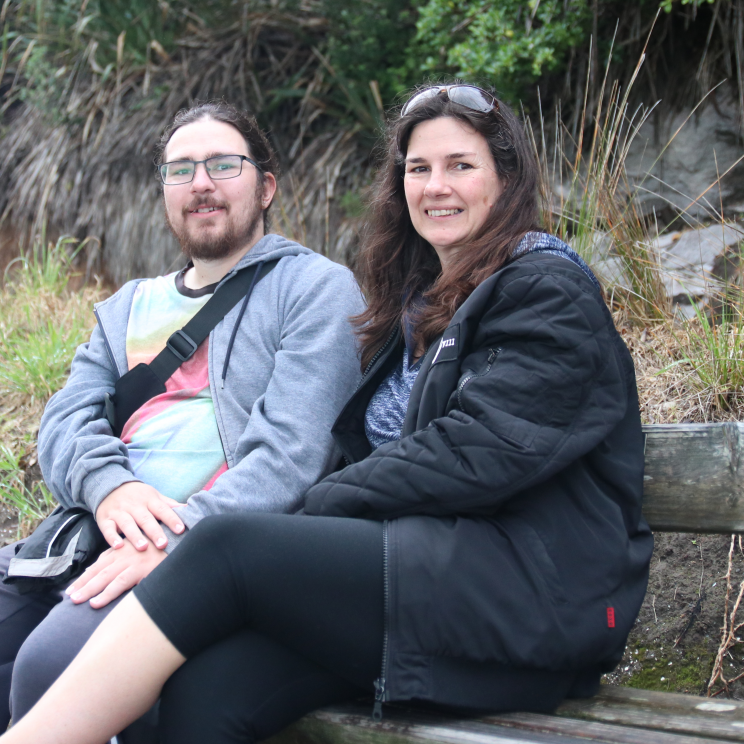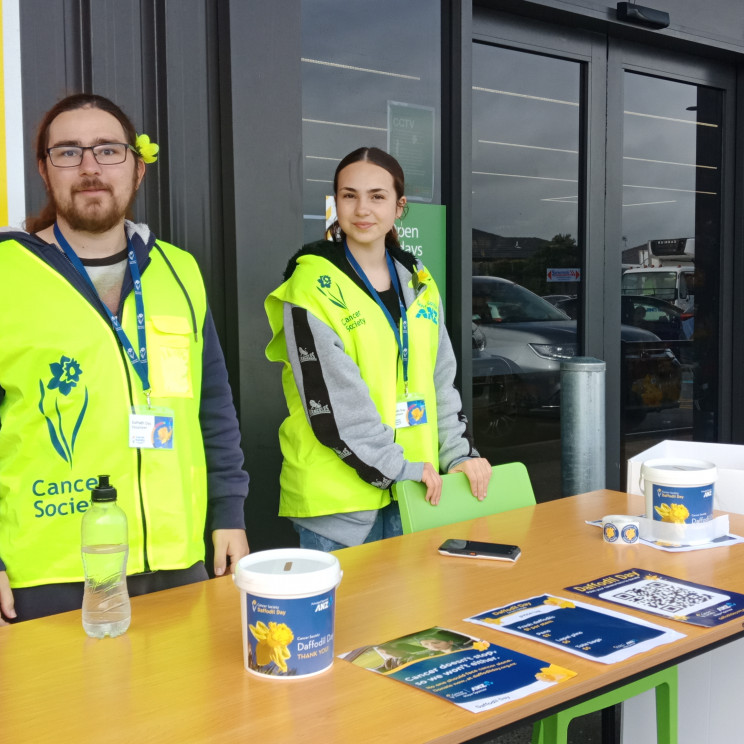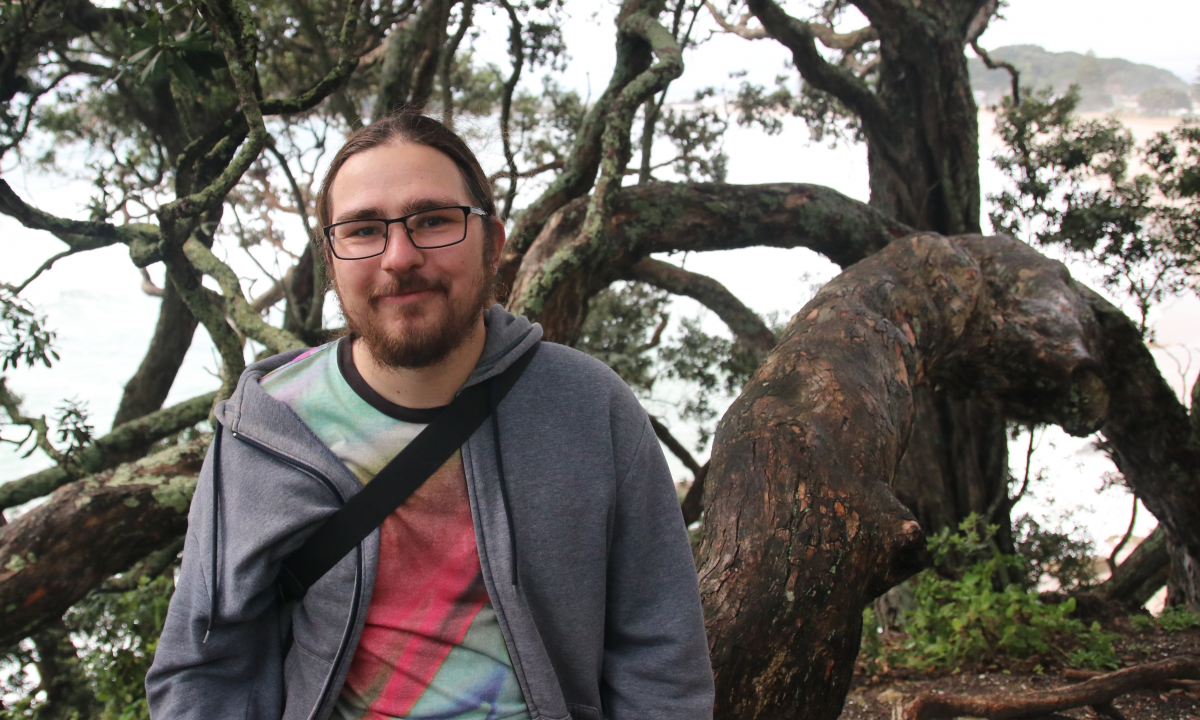In the early morning of 6 June 2020, Kelli James and son Ayden walked through Auckland Airport. A gruelling 33-hour journey lay ahead of them, but Ayden was struggling just to stay on his feet.
In the weeks leading up to the flight he’d been coping with debilitating headaches, and just three days earlier he’d had a seizure. Kelli feared Ayden wouldn’t make the journey halfway around the world for life-saving cancer treatment in Wales.
“He was so sick. I was scared we’d get stranded in Qatar and wouldn’t even make it. I asked Ayden, ‘can you do this?’ He said, ‘Mum, I’ve got to try’.”
Two surgeries had failed to remove a tumour sitting at the base of Ayden’s skull. Radiation therapy was the last option. But not just any type of radiation therapy – Ayden needed proton beam therapy; a treatment not available in New Zealand. And with Covid-19 sweeping across the world, it had been a real battle to arrange the trip to Wales.
Ayden Morgan was just 22 when he was diagnosed with chondrosarcoma – a rare form of bone cancer located in the cartilage on the base of his skull. It’s rarer still in people as young as Ayden.
The first sign that something wasn’t right was when Ayden felt numbness creeping across one side of his face. Kelli put it down to troublesome wisdom teeth. It wasn’t until an MRI was hastily scheduled for a Friday afternoon that Kelli realised it was something much more serious.
Like most young people, Ayden was looking to the future; finding work experience and thinking about studying computer science. But all his plans were quickly pushed aside as he faced the reality of a cancer diagnosis. He was out on a bike ride on the day he received a phone call confirming surgery to remove part of the mass.
“It suddenly felt real. There was an extra layer of ‘it’s really happening’,” says Ayden.

The first surgery was tough and took a huge physical and mental toll on Ayden. He says it was “the worst experience” of his life, especially when the surgery affected the peripheral vision on his right side.
“It was a shock when I first saw him after surgery,” says Kelli. “And when he said, ‘Mum, I can’t see you’. I just panicked.”
But things became even more worrying just days later when Ayden’s sodium levels dropped, and he became confused.
“He didn’t know who or where he was. He was totally blank and I thought, what have we done? Ayden was gone; my boy’s here, but I’ve lost him.”
Once Ayden’s condition stabilised and it was time to head home, Kelli remained concerned. Loss of vision and extreme fatigue from the surgery impacted Ayden’s confidence and Kelli was worried about him being home alone all day while the rest of the family was at work or school. That’s when she turned to Cancer Society for support.
“When we found Angelique, we seriously hit the jackpot. We were so lucky,” says Kelli.
Cancer Society nurse Angelique Ensor encouraged Ayden to join the weekly walking group at Mount Maunganui. Spending time outdoors with other people going through a similar cancer experience provided a positive focus for Ayden. Angelique also helped him apply for a Cancer Society grant for a gym membership to support his physical recovery after surgery.
But getting into the right headspace to face a second surgery later in the year to remove more of the tumour was more challenging. Angelique connected Ayden with a local psychologist.
“I was really reluctant about having the second surgery,” says Ayden. “The risks were extremely high. I was worried about recovery, and I’d lost vision in the first surgery. I thought, what’s going to happen next time?”
Talking with Angelique about the decision, having the support group and getting help from a psychologist all contributed towards helping Ayden get in a good frame of mind before making such a crucial decision about his treatment. One of the things he learned was the importance of doing things that brought him joy.
Ayden asked to push the surgery date out until after Christmas so they could enjoy summer together as a family.
“As a family unit we were doing things; Rainbow’s End, a family 21st birthday. We focused on creating moments and memories, not knowing what was ahead of us,” says Kelli.
The second surgery went well. But sadly, it didn’t mean the end of treatment for Ayden. Specialists advised the remaining tumour wouldn’t respond to chemotherapy, and normal radiation therapy wouldn’t be effective at levels safe for the head. Instead, they recommended proton beam therapy, a more targeted type of radiation therapy not currently available in New Zealand or Australia.
But, with support from the Ministry of Health, Ayden could get this lifesaving treatment in the US.
He didn’t know who or where he was. He was totally blank and I thought, what have we done? Ayden was gone; my boy’s here, but I’ve lost him.
The proton beam therapy was planned for April 2020. By then Covid-19 was raging around the world. Borders were closing, travel was uncertain and health systems were buckling under the pressure.
When the clinic in the US contacted Kelli and said they could no longer take patients like Ayden because their facility was redeployed for the pandemic response, Ayden and his family were devastated. With proton beam therapy off the table, the only option would be a regular course of radiation therapy, even though they knew it had little chance of success. It felt like a death sentence for Ayden.
“I remember Angelique rang while I was at work,” says Kelli. “I walked into the carpark and I just bawled my eyes out. It was a terrible time. They’d been telling us that the proton therapy was the best treatment for Ayden, and now they wanted us to accept second best because of a bloody virus.
“There are so many centres around the world that offer the treatment. We just needed one. So off Angelique went, making calls. It was very chaotic with emails and texts flying around.”
Angelique worked closely with Ayden’s oncologist. There were two centres still accepting international patients. But time was running out.
“Ayden was getting bad. I really do believe the stress made the symptoms worse. The headaches couldn’t be controlled with medication. He was in bed a lot,” says Kelli.
“I don’t know what would have happened if it wasn’t for Angelique. She didn’t stop. She was there every step of the way.”

Between Cancer Society, specialists and the Ministry of Health, Kelli says there was a “whole team behind the scenes pushing for Ayden”. Even the High Commission in London was contacted to provide support to Kelli and Ayden after their epic flight.
“The relief to have got there after 30 hours was overwhelming,” says Kelli. “When we got to Heathrow there were two official-looking men waiting the second we landed. I started welling up; it was such a relief. I just wanted to hug them. We would never have made the walk through Heathrow without them.”
In total Kelli and Ayden spent 16 weeks away from home while he received proton beam therapy at the Rutherford Cancer Centre South Wales in Newport. It’s not the sort of OE most young people dream of, but for Ayden and his family, it’s meant so much more.
Since returning home, Ayden’s scans have shown the tumour has stabilized and there’s evidence of shrinkage. He’s still coming to terms with impaired vision, but his headaches have improved and the frightening seizures have stopped. There’s a lot to be grateful for, says Kelli.
“Angelique’s been there every step. She’s been Ayden’s biggest supporter, cheering him on all the way. She’s such a special person. I always felt heard and was never made to feel like I was overreacting, which was really reassuring.”
“Angelique’s not just good at listening,” says Ayden. “She’s good at action too. I couldn’t have done it without her.”
Angelique’s been there every step. She’s been Ayden’s biggest supporter, cheering him on all the way. I always felt heard and was never made to feel like I was overreacting
You can help us help families affected by cancer. Make a donation today so that people like Ayden get the support they need here.

